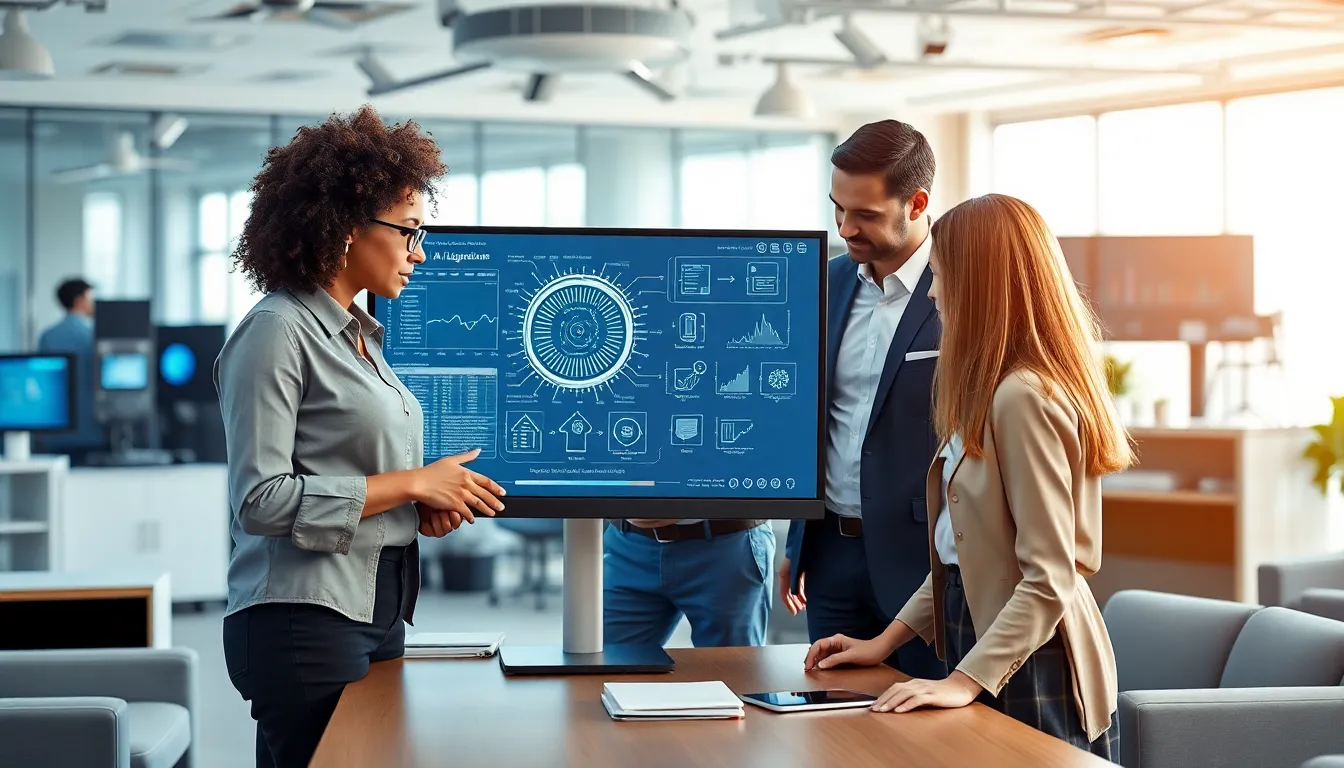Table of Contents
ToggleIn a world where technology evolves faster than a cat video goes viral, keeping up with the latest tech trends can feel like a wild goose chase. From AI that can write poetry to gadgets that promise to make your coffee while you’re still snoozing, the tech landscape is bursting with innovations that could make anyone’s head spin.
But fear not! This article dives into the most exciting trends shaping our digital future. Whether you’re a tech guru or just someone who occasionally wonders what all those buttons do, there’s something here for everyone. So grab your favorite device, settle in, and get ready to explore the trends that could change the way we live, work, and maybe even procrastinate.
Latest Tech Trends in 2023
Artificial Intelligence (AI) continues to dominate the tech landscape in 2023. Enhanced algorithms improve efficiency in sectors like healthcare and finance. Many companies adopt AI-driven tools to optimize operations and enhance customer service.
5G technology plays a significant role in increasing mobile connectivity. Faster speeds enable real-time data transfer, revolutionizing industries such as gaming and augmented reality. Businesses leverage 5G to enhance customer experiences and streamline processes.
Cybersecurity remains a top priority in the digital age. With rising threats, organizations invest in advanced security measures, including zero-trust architectures. Regular security assessments and employee training help mitigate risks associated with data breaches.
Sustainability drives innovation in tech solutions. Green technologies reduce environmental impacts, appealing to eco-conscious consumers. Companies introduce energy-efficient products and focus on creating sustainable supply chains.
The Internet of Things (IoT) expands its influence across various domains. Smart home devices improve daily life through automation and enhanced connectivity. Industries implement IoT solutions to optimize logistics and monitor equipment performance in real-time.
Blockchain adoption gains momentum in various applications beyond cryptocurrencies. Transparency and traceability in supply chains become essential. Enterprises explore blockchain for secure transactions and improved data integrity.
In the realm of remote work, collaboration tools evolve to meet growing demands. Features like virtual reality meetings enhance interactions among remote teams. The hybrid work model gains traction, requiring technology that fosters seamless communication.
Impact of AI and Machine Learning

AI and machine learning are reshaping various sectors, enhancing processes and productivity. Significant advancements take place in automation, impacting industries globally.
Advancements in Automation
Automation leads to increased efficiency and accuracy in tasks. Robotics paired with AI enhances manufacturing capabilities, allowing for faster production cycles. Businesses harness machine learning algorithms to optimize workflow, minimizing errors. Addressing routine tasks through automation frees employees for strategic initiatives. Companies utilizing these technologies report productivity gains of up to 30%. More industries are adopting AI-driven tools for seamless operations, from healthcare to logistics.
Ethical Considerations
Ethical considerations arise from rapid tech advancements. Concerns about data privacy and bias in AI algorithms require attention. Companies face scrutiny regarding transparency and accountability in AI decision-making. Strategies are needed to ensure fair treatment in automated processes. Policies promoting responsible AI use become essential to mitigate risks. Stakeholders emphasize the importance of diverse data sets to reduce biases. Maintaining public trust in AI technologies hinges on ethical standards that prioritize user rights.
Growth of Remote Work Technology
Remote work technology is rapidly advancing, driven by demand for flexible working arrangements. Organizations increasingly rely on digital solutions that enhance productivity and connectivity between remote teams.
Essential Tools for Teams
Collaboration software tops the list of essential tools. Platforms like Slack and Microsoft Teams facilitate communication, streamline project management, and foster teamwork. Video conferencing tools such as Zoom and Google Meet ensure face-to-face interactions, enhancing engagement. Cloud storage options like Dropbox and Google Drive provide easy access to shared documents, promoting seamless collaboration. Data shows that companies using these tools can improve productivity by 25%, making them vital for remote work success.
Future of Hybrid Work Models
Hybrid work models are shaping the future landscape of employment. A mix of in-office and remote work is appealing to employees, enhancing job satisfaction. Research indicates that 70% of workers prefer hybrid arrangements due to flexibility. Employers are adapting policies that accommodate this trend, focusing on results rather than physical presence. As businesses embrace this model, they invest in technologies that support both in-person and remote employees, ensuring productivity and collaboration remain strong.
The Rise of Smart Home Devices
Smart home devices are gaining traction, as consumers embrace convenience and technology integration. These innovations modularize control over home environments, allowing for seamless automation.
Benefits of Home Automation
Home automation offers significant advantages. Energy management becomes easier, leading to reduced utility costs through the optimization of heating and cooling systems. Security gets enhanced with smart locks and cameras, providing real-time monitoring. Convenience levels rise with features like voice control and scheduling for lighting and appliances, making daily tasks simpler. Health and wellness benefit too, as devices aid in tracking air quality and managing optimal living conditions. Adoption of smart gadgets can improve energy efficiency by up to 40%, illustrating their positive impact on budgeting and eco-friendliness.
Privacy Concerns in Smart Technology
Privacy concerns frequently arise with smart technology. Many devices collect user data to enhance personalization, leading to potential misuse. Smart speakers and cameras can inadvertently capture sensitive information during usage, raising alarms over surveillance. A lack of robust security measures can also expose homes to hacking incidents. Consumers often worry about data being sold to third parties without consent, creating distrust. It’s vital for manufacturers to implement stringent privacy policies and transparency to mitigate risks, ensuring that users feel safe in their automated environments.
Sustainability in Technology
Sustainability shapes the technology landscape, driving innovations that minimize environmental impact.
Eco-Friendly Innovations
Renewable energy sources gain momentum as tech companies focus on reducing carbon footprints. Solar and wind power integrations create greener data centers, cutting energy consumption significantly. Smart devices now prioritize energy efficiency, with some models using up to 40% less energy than traditional options. Furthermore, advances in battery technology support longer-lasting devices, reducing electronic waste. The push for eco-friendly manufacturing processes involves using recyclable materials, decreasing reliance on single-use plastics. Brands leveraging such innovations attract eco-conscious consumers, aligning with the growing demand for sustainable practices.
Corporate Responsibility
Companies recognize the importance of corporate responsibility in promoting sustainability. By implementing eco-friendly practices, organizations enhance their brand image while appealing to environmentally aware consumers. Many now prioritize sustainability in supply chains, ensuring responsible sourcing and production methods. Reports indicate that businesses investing in sustainable technologies not only reduce their environmental footprints but also increase profitability. Transparency and ethical practices foster trust among consumers, leading to stronger loyalty. As more organizations adopt sustainable initiatives, a shift towards greener technology becomes evident, influencing industry standards and encouraging others to follow suit.
The landscape of technology is evolving at an unprecedented pace. Staying informed about these trends is essential for individuals and businesses alike. Embracing advancements in AI, 5G, and IoT can drive efficiency and enhance everyday experiences. As organizations prioritize cybersecurity and sustainability, they not only protect their assets but also appeal to a more eco-conscious consumer base.
The rise of remote work technology and smart home devices signifies a shift towards greater convenience and flexibility. It’s clear that the future will be shaped by these innovations, making it crucial to adapt and leverage them for success. By understanding and integrating these trends, everyone can navigate the tech-driven world more effectively.







